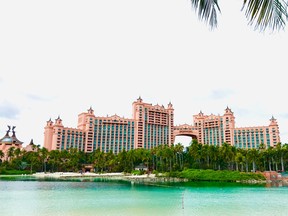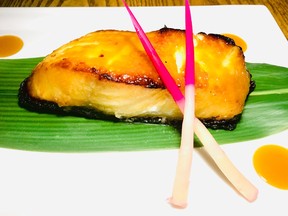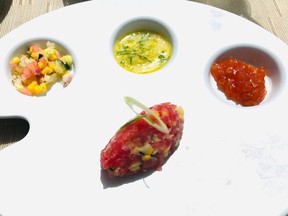Reviews and recommendations are unbiased and products are independently selected. Postmedia may earn an affiliate commission from purchases made through links on this page.
Bahamian food reflects the colourful, warm-hearted culture

Food writer Mia Stainsby experiences the spectrum of Bahamian food at the Atlantis Resort, the biggest tourist draw in The Bahamas.

Article content
Kenneth McKenzie, who runs McKenzie’s Fresh Conch from a pink-and-white-striped stall at the Atlantis Paradise Island Resort in The Bahamas, pulls the conch meat out of the giant shell and removes a translucent filament.
Advertisement 2
Article content
It’s the pistol; locals call it Bahamian Viagra. He locks eyes with my husband.
Article content
“Pow-ah!” he chuckles. “When guys eat this, it gives them pow-ah … okay? It keeps you up all night, keep you runnin’ right.”
He slurps the clear strand and chews.
“Mmmmm, sooo good! Tastes like chicken and pork chop all in one,” he laughs.
Conch — pronounced ‘konk’ — is the food of the Bahamian Islands. At McKenzie’s, it’s served in a ceviche-style salad with chopped tomatoes, orange and lime juice, chopped red peppers and onions.
Multi-Grammy-winning rocker Lenny Kravitz calls The Bahamas ‘his country’ where songs come to him, written.
“Bahamians are very unique people,” he says in a tourism commercial. “They’re really cool. They’re hospitable. They’re warm. They’re really funny and have a great sense of humour.”
Advertisement 3
Article content
McKenzie embodies that sunny Bahamian nature.
“You make the best of whatever you make out of life,” he says.
The massive Atlantis Resort — 3,800 rooms, 277 hectares — is the biggest tourist draw in The Bahamas with thrills like a 60-foot water slide that shoots you through a clear tunnel in a shark-filled lagoon, amazing marine habitat, an underwater Atlantis, golf course, casino and a marina.

As for me, I was busy checking out the food. There are some 40 restaurants and bars and, among them, showcases of the unique Bahamian cuisine as well as restaurants by celebrated chefs like Nobu Matsuhisa, José Andrés, Todd English and, soon, Michael White.
For me, where food is the boss of my travels, it was great geo-positioning. The resort sets up satellite locations for some of the country’s popular local culinary stars — like McKenzie, whose original popular-and-pink restaurant is at Potter’s Cay in Nassau.
Advertisement 4
Article content
Another hot local spot adopted into the Atlantis Resort complex is Sun & Ice Gelato. Owner Wayne Moncur was executive chef at the Four Seasons Hotel on Paradise Island before becoming obsessed with gelato. He channels his late grandfather, who loved to make ice cream the old-fashioned way with salt and ice, he says.
“I’m telling the Bahamian story through ice cream. Every flavour has a story.”
He’s developed around 100 flavours, both sweet and savoury. He draws from the tropical plenty — coconut, soursop, mango, guava, pineapple, passion fruit, sugar apple, guineps, date-like jujubes, hog plums, hibiscus, bananas, sea grapes, breadfruit, hot peppers, cassava, tamarind, ackee, citrus fruits and more, mostly sourced from backyard farms.
Advertisement 5
Article content
“When I was young, we had cornflakes with canned milk. The British used a lot of tinned ingredients,” Moncur says. “Well, I recreated that, incorporating little cornflake cookies.”
Other creations include junkanoo, after the Bahamian street parade, watermelon with seeds as well as conch salad sorbet, and goat pepper and chocolate.
To capture a Bahamian’s experience of strawberries, he uses wild strawberries and roasted cultivated ones. Another flavour tastes of “the unofficial dessert of the Bahamas — guava duff — which is like an English jam roll,” he says.
As I said — obsessive.

Frankie Gone Bananas is yet another transplanted local favourite; its original location is Arawak Cay, a restaurant street in Nassau. At the resort, the room is a riot of colours and conch is queen — in chowders, nachos and junkanoo salad (in the spirit of junkanoo, a colourful Bahamian street parade), scorched, frittered, cracked, battered and deep-fried.
Advertisement 6
Article content
I tried the peas and rice, another Bahamian must-try staple. The dish has pigeon peas, rice, tomatoes, tomato paste, onions, herbs, salted pork or bacon. It’s a dish introduced by the colonizing British — 85 to 90 per cent of Bahamians are descendants of British and American slaves, and it’s evident in dishes like this.
A lovely rum cake, baked in individual moulds, showcases the popular Bahamian spirit as does the Bahama Mama cocktail with rum, coffee liqueur, pineapple juice and cherry garnish.
Frankie Gone Bananas, however, will soon be replaced by Bimini Road, a restaurant specializing in local seafood and Bahamian specialties like junkanoo salad, conch fritters, local beers and juices. It’s named after an underwater rock formation near Bimini Island, thought to be evidence of the lost civilization of Atlantis.
Advertisement 7
Article content
Dining at Sip Sip (Bahamian for chit-chat) at Atlantis resort, would otherwise have required a bumpy boat ride to another island. The restaurant focuses on local ingredients in a country that’s become largely dependent on imported foods. At the Atlantis Sip Sip, I quenched my thirst with a switcha, a local drink like a limeade often made with abundant backyard limes. I had their conch chili as well as quesadilla with local spiny lobster. However, in November, Sip Sip will be replaced by Frezca, highlighting local seafood with global flavours.
The Point, on the Harbourside area of Atlantis, elevates casual Bahamian dishes thanks to Chef Verlica Pennerman. Tuna tartare arrived on a plate shaped into a painter’s palette with indents for the locally caught tuna and tropical salsas. Her conch salad was dressed in finery and conch fritters were light and delicate like tempura. A whole fried fish came with a neat dome of peas and rice. We finished this enormous lunch thanks only to its lightness of being.
Advertisement 8
Article content
One morning I tried souse, a brothy stew made with chicken, veg, lime juice and chilies, and said to be good for hangovers, not that I, myself, was soused. I was told Bahamian grandmothers say the chilies in the stew “can kill the devil.” With johnnycakes, a Bahamian cornbread, it made for a bracing breakfast at Mosaic restaurant.
Post-COVID-19 Mosaic will change to Paranza with Chef White, former owner of a restaurant group with two Michelin-starred restaurants — Marea and Ai Fiori — in New York. Paranza will be a “love letter to Italy” with a focus on seafood.
Another chef, Adrien Delcourt, will be installed at Cafe Martinique this fall. He’s worked at several Michelin-starred restaurants in Paris — Le Jules Verne, L’Atelier de Joel Robuchon, L’Orangerie and Le Pré Catelan. He’ll be serving Parisian-style food using Bahamian ingredients.
Advertisement 9
Article content
Since tourism is the economic driver and the islands are second homes to the rich and famous, fine dining has become very much a part of Bahamian cuisine.

Nobu restaurant dazzled with amazing seafood from Japan for its sashimi and nigiri. There were inventive moves like the honey truffle tuna tataki on crispy rice and exquisite Wagyu beef with Peruvian anticucho sauce — a bit of a wink as anticuchos, in Peru, are street foods made with cheap meat cuts like beef heart.
And the famous miso-marinated black cod, which Nobu restaurant popularized globally, was as good as I had imagined. The long marination in miso and sake lees takes it to heavenly places.
“Some people travel around the world to the different Nobu restaurants like they’re following their favourite band,” our server said.
Advertisement 10
Article content
At Fish by José Andrés, I attended a cooking class and ate the results. Well, the class watched and sometimes chopped stuff for tuna tartare and grilled strawberry grouper with black garlic mojo sauce.
The dessert, chocolate mousse with meringue ice cream, was so good two women asked for seconds, moderation be damned, after the lunch that included champagne and oysters to start.
A dramatic Josper charcoal grill and oven, centre stage in the airy restaurant, was responsible for the hint of smoke and rustic char to the seafood.
Chef Andrés has been deservedly named one of Time’s 100 Most Influential People and awarded Outstanding Chef by the James Beard Foundation. He’s also received several humanitarian awards for founding World Central Kitchen, a food relief group that springs into action after natural disasters — as it did in The Bahamas after Hurricane Dorian wiped out two northerly islands in 2019.
Advertisement 11
Article content
Atlantis Resort donated US$3 million and the use of its banquet facilities, where Andrés and the team pumped out meals for 10,000 people a day. And, of course, World Central Kitchen is now busy in areas hit by hurricanes in North America, floods in Pakistan and the war in Ukraine.
But when Canada’s in a chill, The Bahamas is a great place to get warmed up, both by folks like McKenzie and the climate.
The writer was a guest of Atlantis Paradise Island, which neither read nor approved this article before publication.
Source: vancouversun.com


